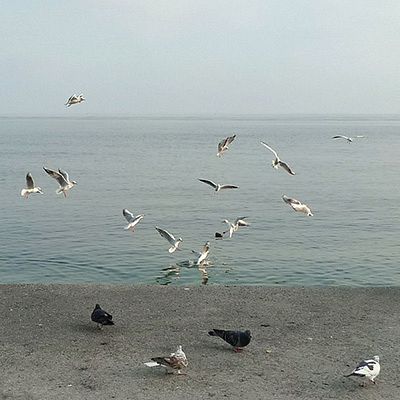essay
A Crimea in impressions
The great Tatar lady speaks Russian clearly and quickly. Proud and principled, she helped to found local schools so that her language wouldn’t die. She tells of past suffering under different regimes but these don’t seem to weigh her down. There’s no heaviness about her and the work of managing a guest house and a family hang lightly on her frame. Things are better now and there is hope for the future.
Bakhchysarai, cultural capital of the Crimean Tatars. Lowing cows, watchful cats, goats, stone sphinxes, and coal smoke. The mellent charm of the muezzin’s call to prayer is warm and welcoming, calling us to god.
A long walk among the tattered ancient streets, a small kitten in our train. A 16th-century Karaite kenassa in near ruins; a number of modest mosques in good repair, dwelling among mud, stones, creeping vines, painted wood, and trickling water. We thread our journey with rides in rattling marshrutkas.
Early morning awake to the chorus of dogs, milky mist unveiling the mountain tops. Omelette breakfast with baklava, black tea with rose petal jam and Turkish coffee. Another place feeling like another time.
Dusty gray-green grass, hillocks. Gold in the scattered trees. Stands of poplars and handsome horses. Hot beams of sun in the face shine back at me as I look out over the domain they lord.
Cerulean. Watercolor stain blots for clouds swarm with black crows chasing smaller birds in the illogic of their own chaotic orbits. Gray sea and glinting sunshine. Gulls, pebbles smoothed to the preciousness of coins. Cold salt wind.
Evpatoria. Tattered streets and tidy squares. Archetype of the Ottoman mosque beside a Byzantine revival church. Why is there a clock in the mosque? Because it tells us the time, my silly one. A square surrounded by arches (in stripes that remind me of Tuscany) and a high dome.
Palace of the Tatar Khan. Chilly rooms decorated with the Soviet restorer’s touch. Painted walls of a clear blue, divided windows with panes of brightly colored glass pour down colored sunlight, gleaming rosehip red, sea blue, honey yellow. Glass case exhibits, books, inscrutable objects. Splendid garments and musical instruments.
Turbaned tombs. Poplar trees tall and glowing yellow. Proud minarets.
In the bus early for a bit of a drive and a bit of a climb. Trees and vines and berries of black, red and blue. Hills and stones; mountains and stones. A tough climb. Thorny bushes, underbrush, slippery stones, furry moss, false footholds. A cool sweet spring and a ruined city to explore.
Overlooking space, a broad valley, a high ridge. Mist in the air and tart rosehips to nibble. Castle, basilica, and cave.
Eski-Kermen. A citadel on an archipelago of rocks rising from the green valley floor. High, a Swiss cheese of caves and ruins. Friendly cats and hikers. Fog, dew and colored leaves, rock basins filled with green water and plants. A rough gray white stone is the fabric of which rooms are carved, and lookouts, caverns, holes, shrines, and reverent spaces.
Khersonesos. A 50-hectare ruined Greek settlement, a place of legend and supposed seed of Russian Christianity. A new basilica, a buzzing of bees, a holy woman makes a chant that flawlessly melds with the interior space, a gesamtkunstwerk from a single voice, delicate as a breath, warming the cavernous church like a careful fire.
Yalta. A city on the sea, a girl with a little dog. We stroll, a flânerie in Crimea. A shining milky silver sea meets a white softly streaked sky, a horizon effaced. We float. We fly. A roaring ship cuts the boiling glass. A colorful capsule on a groaning thread lifts us up above the surly earth. Leave a flower of the mind behind and descend.
The rack, the ruin, a neglected opulence abashed, hiding behind wrought iron and curtains of greenery. A dignified elderly woman waits in the shadows and cries for her faded glory.
Why is the sea here called black? The Turkish language uses the words white and black to signal the ideas of greater and lesser. Thus, when there are two of anything needing naming, seas, for example, we get a White Sea (for the Turks, the Mediterranean) and a Black Sea.
A song (from a different sea) comes to me.
|
Лети быстрее, чайка! В синем море вечер настаёт Поскорее птица! Узнай-ка как милый живёт! Скажи ему не стану о нём тужить, грустить не устану долго его любить. |
Fly faster, seagull! Evening falls on the blue sea. Faster, bird! Find out how my dear one abides. Tell him I do not mourn or grieve; that I will not weary of his love. |
The seagull song from У самого синего моря (“By the Bluest of Seas,” Boris
Barnet, USSR, 1936). Although this recording sounds like it ends abruptly, this
is, in fact, the entire song as it is heard in the film.
This essay was first published on the blog Poemas del río Wang as part of the group post Together in the Crimea.
Three more filecasts, all field recordings, came from the source material collected during this journey: